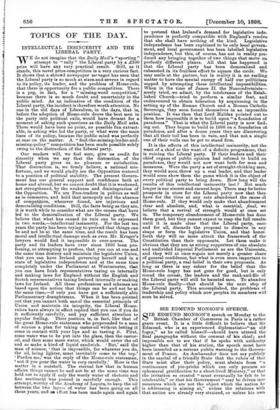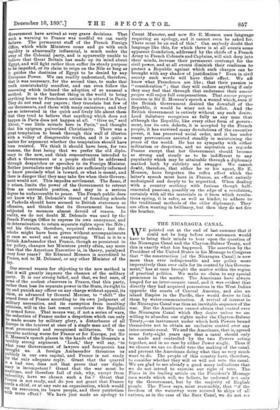SIR EDMUND MONSON'S SPEECH.
SIR EDMUND MONSON'S speech on Monday to the British Chamber of Commerce in Paris is a rather grave event. It is a little difficult to believe that Sir Edmund, who is an experienced diplomatist—" an old• fogey," as he called himself—should have uttered the- final paragraphs without the consent of his chief; and impossible not to see that if he spoke with authority higher than that of his station, the speech must have• been intended as a serious public warning to the Govern- ment of France. An Ambassador does not say publicly in the capital of a friendly State that the rulers of that State must alter their policy, must abstain from " continuance of pin-pricks which can only procure an ephemeral gratification to a short-lived Ministry," or that the irritation so created " must eventually be felt to be intolerable," or that his Government " may be driven into measures which are not the object which the nation he is addressing is aiming at," unless the relations with that nation are already very strained, or unless his own Government have arrived at very grave decisions. That such a warning to France was needful we can easily believe. The permanent staff of the French Foreign Office, which while Ministers come and go with such rapidity is abnormally influential, is much under the sway of the Colonial party, and is apparently unable to believe that Great Britain has made up its mind about Egypt, and will fight rather than suffer its steady purpose to be impeded, or its claim to reign on the Nile so long as it guides the destinies of Egypt to be denied by any European Power. We can readily understand, therefore, that it was necessary, for the second time, to make that truth unmistakably manifest, and can even follow the reasoning which induced the adoption of so unusual a method. It is the hardest thing in the world to bring anything home to Frenchmen unless it is uttered in Paris. They do not read our papers ; they translate but few of our documents, and those with many omissions ; and they are so interested in the quick and lively life about them that they tend to believe that anything which does not happen in Paris does not happen at all. " Give us," said About, " one little miracle here in Paris," and thought that his epigram pulverised Christianity. There was a great temptation to break through this wall of illusion with a volley of disagreeable truths, and it is quite a matter for argument whether the temptation should have been resisted. We think it should have been, for two reasons, the first being that we prefer the old diplo- macy to the new, and think remonstrances intended to affect a Government or a people should be addressed through despatches or speeches to its Foreign Minister. Neither journalists nor the public are sufficiently informed to know precisely what is toward, or what is meant, and there is danger that they may take fire when their Govern- ment would not. This impedes settlement. The flame, if it arises, limits the power of the Government to retreat from an untenable position, and may in a serious degree be unfavourable to peace. The French public does not know why M. Deloncle 's threat of founding schools at Fashoda, should have seemed to British statesmen so offensive, and thinkri that its Government has been subjected to menaces almost devoid of reason. In reality, we do not doubt M. Deloncle was used by the French Foreign Office to express its own annoyance, and its determination to retain separate rights upon the Nile ; and his threats, therefore, required rebuke ; but the rebuke might have been given without accompaniments at once so novel and so exasperating. What is it to a British Ambassador that France, though so persistent in her policy, changes her Ministers pretty often, any more than that the American Executive is, in theory, paralysed ?very four years ? Sir Edmund Monson is accredited to France, not to M. Delcasst, or any other Minister of the day.
Our second reason for objecting to the new method is that it will greatly improve the chances of the military party. It is our strong belief, and that, we feel sure, of some of the coolest observers in France, that this party, rather than lose its separate power in the State, its right to try and punish any officer on any charge without appeal, its claim, as advanced by General Mercier, to " shift " the armed force of France according to its own judgment of military necessities, and its exemption from insulting Criticism, will in the last resort overthrow the Republic by armed force. That means war, if not a. series of wars, the reduction of France under a despotism which can only be made secure by military glory, a disturbance of all Europe in the interest at once of a single man and of the moat pronounced and recognised militarism. We can conceive nothing worse for France or for Europe, yet Sir E. Monson's speech places in the hands of the Generals a terribly strong argument. 'Look,' they will say, ' to what your Government of lawyers and bourgeoisie has brought us. A foreign Ambassador threatens us publicly in our own capital, and France is not ready for the only adequate reply. Grant that the quarrel is a bad one, does not that prove that our diplo- maeV is incompetent? Grant that the war must be maritime, and therefore full of risk, why, except from imbecility, have we chosen such a foe ? Grant that France is not ready, and do you not grant that France Deeds a chief, or at any rate an organisation, which would use its resources, its brave people, and their patriotism with more effect ? We have just made an apology to Count Munster, and now Sir E. Monson uses language requiring an apology, and it cannot even be asked for. There must be an end of this.' Can anybody doubt that language like this, for which there is at all events some apparent foundation, addressed by the chiefs of a French Army to French Colonels and Captains, will sink deep into their minds, increase their permanent contempt for the civil power, and at all events diminish their readiness to protect a Republic against which such charges can be brought with any shadow of justification ? Even in civil society such words will have their effect. We all know what Frenchmen are like ; that their passion is " consideration " ; that they will endure anything if only they may feel that through that endurance their amour propre will enjoy full compensations. That amour propre receives in Sir E. Monson's speech a wound which, even if the British Government desired the downfall of the Republic, it would be wiser not to inflict. And the British Government is entirely without any such desire. Lord Salisbury recognises as fully as any man that although the Republic, like every other form of govern- ment, has its own defects, it is accepted by the French people, it has survived many de volutions of the executive power, it has preserved social order, and it has under many provocations assisted steadily in maintaining the peace of the world. He has no sympathy with either militarism or despotism, and no aspiration as regards France except that her Government should become so strong and steady as to be indifferent to any popularity which may be attainable through a diplomacy marked both by subtlety and swagger. We cannot, doubt, therefore, that either he or his agent, Sir E_ Monson, have forgotten the reflex effect which the latter's speech must have in France, an effect entirely undesigned and deeply to be regretted. When dealing- with a country seething with furious though half- concealed passions, possibly on the edge of a revolution, certainly with all the materials in it from which revolu- tions spring, it is safer, as well as kinder, to adhere to the traditional methods of the older diplomacy. They are often wanting in brilliancy, but then they do not fire the heather.











































 Previous page
Previous page